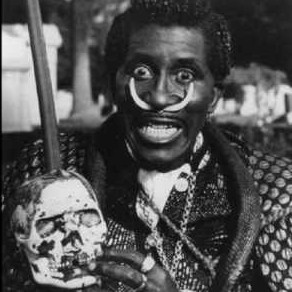If you are looking for some weird creepy sounds this Halloween, look no further than this weird sixties album by the Marty Manning Orchestra, “The Twilight Zone: A Sound Adventure In Space.”
In 1960, the year this album was released, Marty Manning was a renowned conductor and arranger for Columbia Records. In the fifties, he had worked with such luminaries as Tony Bennett, Vic Damone, Buddy Greco and Barbara Streisand. He even won a Grammy for his work on Bennett’s “I Left My Heart In San Francisco”.
 |
| Marty Manning In Action |
Perhaps bored with arranging strings for tin pan alley balladeers, Manning and producer Ernie Altschuler got together and recorded this freaky way out soundscape.
Filled with traditional instruments such as woodwinds, brass, guitars and pianos, Manning and Altschuler also threw in the kitchen sink of sound using a huge array of percussion instruments (marimbas, xylophones, tympani, tuned bongos, tuned logs!?!) and weird futuristic sounding instruments such as the Martinot, the Serpent (a snake shaped brass instrument) the Bazzimba and the Ondioline (an early synthesizer played by Manning himself). Add in the voice of Lois Hunt,who wails throughout, and you get a set of space age bachelor pad circus music from Mars.
 |
| The Serpent |
 |
| The Ondioline |
In addition to the cover of “The Twilight Zone Theme”, the album contains such spaced out numbers as, “Forbidden Planet”, “Far Away Places” and “Spellbound Concerto”.
Not sure what exactly the Columbia Records executives thought of all this but it was the last experimental album Marty Manning ever put out. For the remainder of the sixties, he went back to arranging music for such MOR schmaltzmeisters as Perry Como, Sarah Vaughn and Harry Belefonte although he did release a cool 45 cover of “The Tarzan March” in 1966 under the name Marty Manning And The Cheetahs.
Marty Manning died in 1971.
Although it wasn’t a hit in its time, I like to think it was an influence on future prog rock Gods such as, Yes, ELP and King Crimson. Could that make Marty Manning the Father Of Prog? Sure, what the hell, why not?








